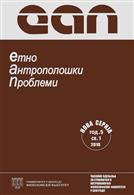Uticaj Johanesa Fabijana na Kloda Levi-Strosa
The Influence of Johannes Fabian on Claude Lévi-Strauss
Author(s): Miloš MilenkovićSubject(s): Anthropology, Structuralism and Post-Structuralism, Methodology and research technology
Published by: Филозофски факултет, Универзитет у Београду
Keywords: history of anthropology; anthropology of anthropology; Johannes Fabian; Claude Lévi-Strauss; structuralism; poststructuralism; positivism; postpositivism; realism; critical anthropology;
Summary/Abstract: In his explicitly theoretical works, Johannes Fabian, one of the key intradisciplinary "affinities" of the author-founder of postmodern anthropology, constructed a specific view of Claude Lévi-Strauss's structuralism, which, as reinterpreted by critical anthropologists, was to fundamentally shape the history of anthropological post-structuralism. In order to explain that the constitution of the subject of research through research itself – i.e. "the invention of the subject of anthropology" – should be accorded the status of the crucial problem of anthropological methodology, Fabian imputed to Lévi-Strauss a rigid and amateurish preconception of research in the natural sciences as inherently positivist. The opposition structuralism/poststructuralism = positivism/postpositivism thus implied was to permanently reshape discussions on realism in critical anthropology, with absurd consequences. The most important of these was the supposedly "antirealist" character of postmodern anthropology, as a direct derivative of critical anthroplogy, which, being aware that reality is created by research, was now seen to play a somehow more ethical and less repressive part in knowledge/power games. The delight at the discovery of this methodological commonplace – that the subject of research is constituted by research itself – might have been but a matter of passing interest, being itself a common enough phenomenon, had not this particular intradisciplinary exchange led to the discrediting of the entire methodological package associated with structuralism. Paradoxically, the retaining of a realistic, radically antipositivist structural method would have made possible the achievement of the cultural-critical ambitions of postmodern anthropology's research program, had not the method been ineptly contaminated by this chain of activist reinterpretation which eventually frustrated the aims it had set out to accomplish.
Journal: Етноантрополошки проблеми
- Issue Year: 5/2010
- Issue No: 1
- Page Range: 35-49
- Page Count: 15
- Language: Serbian

